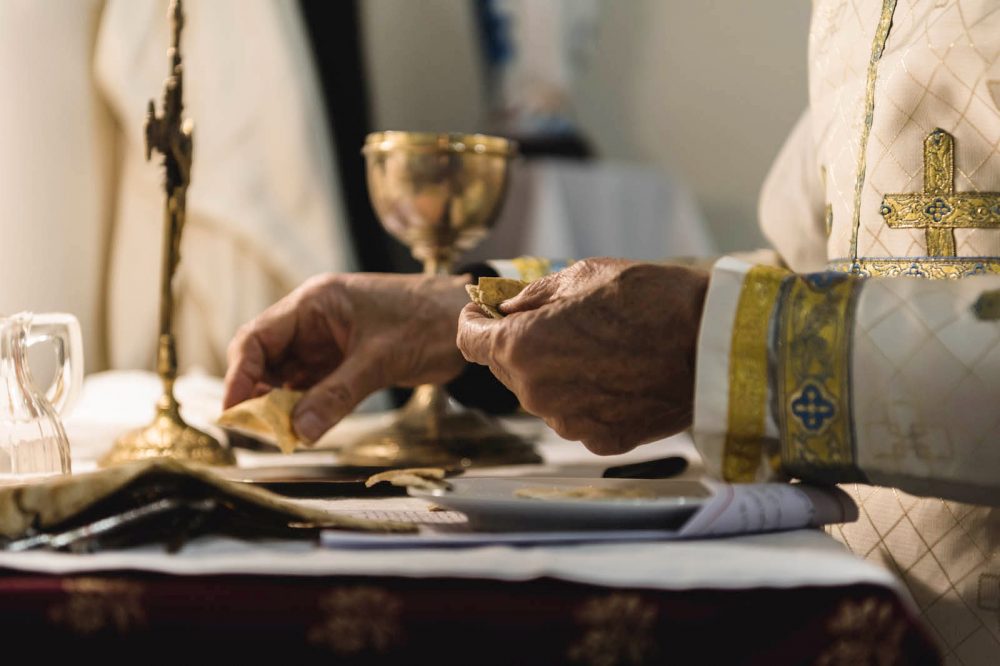Rev. José Mario O. Mandía
jmom.honlam.org
FOURTH PETITION: GIVE US THIS DAY OUR DAILY BREAD
“THIS DAY” in the prayer He taught us, Jesus specifies that we should ask our Father to give us “this day our daily bread.” “This day,” not this week, or next month. The phrase reminds us of God’s instructions to Moses about the manna He gave the Israelites to eat in the desert as narrated in chapter 16 of the book of Exodus.
The “people of Israel murmured against Moses and Aaron in the wilderness” (v. 2), so “the LORD said to Moses, ‘Behold, I will rain bread from heaven for you; and the people shall go out and gather a day’s portion every day, that I may prove them, whether they will walk in my law or not. On the sixth day, when they prepare what they bring in, it will be twice as much as they gather daily” (v. 4-5)
The Israelites were blessed with a new kind of bread which they called ‘manna’ (v. 31), with the instruction not to “leave any of it till the morning. But they did not listen to Moses; some left part of it till the morning, and it bred worms and became foul; and Moses was angry with them” (v. 19-20).
“On the sixth day they gathered twice as much bread” and whatever was left over “they laid it by till the morning, as Moses bade them; and it did not become foul, and there were no worms in it” (v 22, 24). But some of them did not follow instructions and “went out to gather, and they found none” (v. 27), thus offending God who told Moses, “How long do you refuse to keep my commandments and my laws? See! The LORD has given you the sabbath, therefore on the sixth day he gives you bread for two days; remain every man of you in his place, let no man go out of his place on the seventh day” (v. 28-29).
The bread we are praying for not only refers to our bodily nourishment. It also applies to our supernatural needs. God gives us our daily supply of spiritual manna – grace. The grace we are given each day is the grace for that day, not for the next. This is what many saints and spiritual writers have called “the grace of the present moment.” And God wants us to use that grace to fulfill our duties for that day.
“Therefore do not be anxious about tomorrow, for tomorrow will be anxious for itself. Let the day’s own trouble be sufficient for the day” (Matthew 6:34).
This is why Saint Josemaría wrote: “Don’t wait until the New Year to make your resolutions. Every day is a good day to make good decisions. Hodie, nunc! — Today, now!” (The Forge, 163).
Sister Faustina prayed thus:
“O My God,
When I look into the future, I am frightened,
But why plunge into the future?
Only the present moment is precious to me,
As the future may never enter my soul at all.
It is no longer in my power to change, correct or add to the past;
For neither sages nor prophets could do that.
And so what the past has embraced I must entrust to God.
O present moment, you belong to me, whole and entire.
I desire to use you as best I can.
And although I am weak and small,
You grant me the grace of Your omnipotence.
And so, trusting in Your mercy,
I walk through life like a little child,
Offering You each day this heart
Burning with love for Your greater Glory.”
(Divine Mercy in My Soul, Notebook 1,1)
The time to respond to grace is not tomorrow but now. Because if we do not use today’s grace, it will be gone by the morrow.
“OUR” Pope Benedict XVI explains: “[W]e pray for our bread – and that means we also pray for bread for others. Those who have an abundance of bread are called to share. In his exposition of the First Letter to the Corinthians – of the scandal Christians were causing in Corinth – Saint John Chrysostom emphasizes that ‘every bit of bread in one way or another is a bite of the bread that belongs to everyone, of the bread of the world.’ … By expressing this petition in the first person plural, the Lord is telling us: ‘Give them something to eat yourselves’ (Mark 6:37)” (Jesus of Nazareth. Baptism to Transfiguration, pp 151-152).
“DAILY BREAD” The adjective “daily” is a translation from the Greek “epiousios.” It is a rare and unusual word, as Pope Benedict XVI points out (see p 153 of his book cited above). In Latin, it is rendered as “supersubstantialis” – super-substantial. The bread we ask for is not only the daily material requirement, but something that goes beyond it, something that also feeds our soul and becomes the pledge of eternal life – the Holy Eucharist.
Thus, this petition has a specifically Christian sense. The CCCC (593) says: “Since ‘man does not live by bread alone but by every word that comes from the mouth of God’ (Matthew 4:4), this petition equally applies to hunger for the Word of God and for the Body of Christ received in the Eucharist as well as hunger for the Holy Spirit. We ask this with complete confidence for this day – God’s ‘today’ – and this is given to us above all in the Eucharist which anticipates the banquet of the Kingdom to come.”


 Follow
Follow


